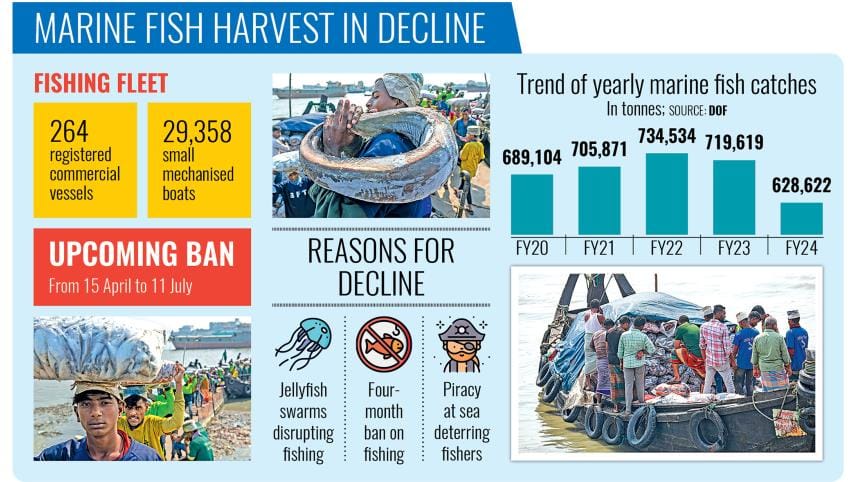Marine fish harvest falls for second straight year

Marine fish catches from the Bay of Bengal have been falling consistently over the past two years, raising concerns as sea fish provide roughly 13 percent of the country's total annual protein production.
Fishermen caught 628,622 tonnes of fish from the bay in fiscal year (FY) 2023-24, the lowest in nine years, according to the Department of Fisheries (DoF).
Industry insiders said a drop in hilsa and other marine fish catches, a surge in jellyfish and government fishing restrictions for nearly four months prevented trawlers from meeting demand last fiscal year.
The Department of Marine Fisheries said 264 registered commercial vessels currently operate in Bangladeshi waters, harvesting deep-sea fish. Besides, 29,358 small mechanised boats are involved in marine fishing.
Marine fish harvests have declined for two consecutive years, reaching a nine-year low of 628,622 tonnes in FY 2023-24. Hilsa catches fell by 40,000 tonnes, while shrimp harvests also dropped. Industry insiders blame jellyfish swarms, fishing bans, piracy and overfishing
Fisheries officials said wooden boats have a fishing capacity of around 45-50 tonnes, while commercial steel vessels can harvest up to 400-450 tonnes.
Md Abdus Sattar, director of the Department of Marine Fisheries, said various challenges in the Bay of Bengal prevented fishing vessels from achieving the expected harvest last fiscal year.
"The abundance of jellyfish in the sea last year created a crisis in fish harvesting. To increase the catch, we are conducting a survey in the bay this year to identify where and what types of fish are available," he said.
Of the total marine fish harvest of 628,622 tonnes in 2023-24, commercial vessels contributed 114,804 tonnes and small boats 513,818 tonnes, a 13 percent year-on-year drop, according to fisheries department data.
During the year, popular hilsa fish catch fell, although it remained the largest haul by trawlers and fishing boats.
Fishers caught 280,918 tonnes of hilsa in 2023-24, down 40,000 tonnes from 2022-23. Shrimp harvests also declined, with the combined drop in hilsa and shrimp catches totalling 60,494 tonnes last year.
Bombay duck was the second most caught fish. Pomfret and tuna are also fished in the Bay of Bengal.
DoF data shows that fishermen harvested 719,619 tonnes of fish in 2022-23, which was lower than the previous year.
Md Salam, captain of a commercial trawler from Continental Group, said their trawlers remained inactive for nearly three months last fiscal year due to jellyfish proliferation, especially during winter.
Mohammad Ali, president of the Chattogram Fishing Trawler Owners' Association and the Fishery Ghat Traders' Association, said the high presence of jellyfish affected fishing activities, leading to lower fish catches.
"When jellyfish swarm an area, other fish are scarce. Almost all fishing grounds within Bangladesh's territorial waters had a high presence of jellyfish."
"However, the situation seems better this year, and we are hopeful for a better catch," he said.
This year, incidents of piracy at sea have increased, causing fear among many fishermen and discouraging them from fishing. As a result, there are concerns that fish harvests will be low this year.
Ali also said that inconsistent rainfall is also affecting fish availability. "Hilsa fish are almost nonexistent in the sea. Fishermen are eagerly waiting for rain."
"Those who are currently going out to sea with their trawlers are unable to recover even half of their expenses due to the low fish catch," he commented.
Officials said the government, in coordination with India, plans to impose a fishing ban in the sea from 15 April to 11 July. A formal notification is likely to be issued.
Md Ashraful Azam Khan, a professor at Department of Fisheries at the University of Chattogram, attributed the decline in fish harvesting in the bay to excessive fishing and the illegal use of small-mesh nets.
He said commercial fishing trawlers continue to use small-mesh nets illegally, evading the watch of law enforcement agencies.
To increase fish reproduction, especially hilsa, the government enforces a fishing ban during the breeding season, which helps boost fish stocks.
Khan said fish availability will rise if proper monitoring ensures no fishing takes place during the ban period.




 For all latest news, follow The Daily Star's Google News channel.
For all latest news, follow The Daily Star's Google News channel.
Comments